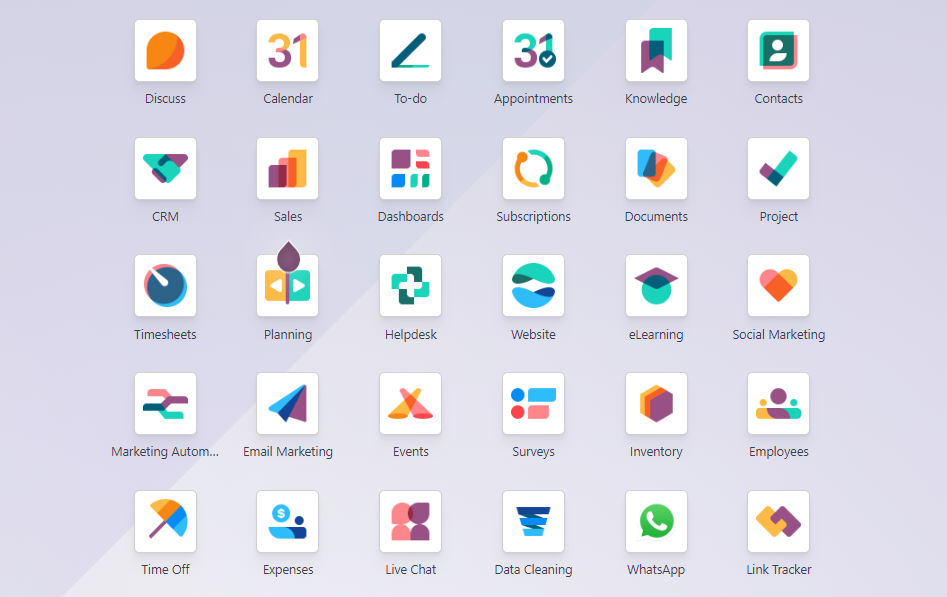Nowadays, the market offers multiple global ERP solutions allowing businesses to grow more rapidly and efficiently. The most popular ERP systems on the modern market are:
- Odoo
- Oracle NetSuite
- SAP S/4HANA
- SAP ERP
- Microsoft Dynamics 365
- Oracle ERP Cloud
- Epicor ERP
- Sage Intacct
- Oracle JD Edwards EnterpriseOne
- SAP Business One
- Salesforce CRM
- Acumatica
All these ERPs are suitable for business operations, yet, there are many differences among them — their benefits and drawbacks vary, which may be crucial for particular companies. In the following article, we’re going to narrow down your choice a bit and tell you about Odoo, the most effective ERP system in our humble opinion.
About Odoo
Odoo ERP system was created by a Belgium company with a rich history. In 2005, Fabien Pinckaers, the founder and current CEO of Odoo, developed his first software product called TinyERP. In three years, the name of the product was changed to OpenERP.
The company began to grow, and in 2010, OpenERP consisted of more than 100 employees. In 2013, the company could boast 1549% growth over a five-year period, so no wonder the company won a Deloitte award for being the fastest-growing company in Belgium. In 2014, the company was officially renamed Odoo and in 2015, it was already listed as one of the 5000 fastest-growing private companies in Europe according to Inc. Magazine.
Since then, Odoo’s popularity started increasing gradually, and in 2019, the company extended up to a $90 million investment. In 2021, the Odoo modules were employed by more than 5 million customers worldwide. And there are plenty of reasons for that.
Why Odoo is the most effective ERP system?
Among the wide range of ERP system tools, the biggest challenge for any business is selecting the ones that will most benefit the company by making its processes easily manageable and consistent. Therefore, before making a decision, it is essential to thoroughly study the ERP system’s capabilities, considering not only the company's current needs but also future needs that may arise from expansion or downsizing. Let's examine the functionality of ERP systems using Odoo as an example:
Key Odoo Features
- You will get a centralized solution available from anywhere in the world, via any device.
- Two versions are available: Odoo Enterprise and free, open-source Odoo Community.
- Odoo apps help companies to automate almost all business processes.
- Apps are completely merged.
- Odoo will help you to automate and track every business operation.
- You pay only for users, and you can use all the functionality available in the system without restrictions.
Odoo ERP is a Flexible Choice
Odoo offers two versions: Enterprise and Community. The Enterprise version requires an annual subscription and provides access to a wide range of modules and high-quality technical support. The Community version is completely free, and you can integrate additional Enterprise modules as needed, paying only for those specific modules. If you no longer need certain modules, you can easily remove or replace them.
Odoo cares about the security of your data.
Odoo prioritizes your data security while offering flexible hosting options. With Odoo as your ERP, you can choose to host your data on Odoo Online, Odoo.sh (dedicated cloud), or your own local infrastructure. This allows you to select the best hosting solution based on your needs and capabilities.

The Odoo Modular Configuration
Modules in Odoo are individual programs that provide specific functionality within the overall system. They seamlessly integrate, enabling companies to customize Odoo to their needs.
If a company has unique requirements, it can hire Odoo experts to develop or modify modules. New modules are easily integrated with existing systems.
Odoo offers about 40 core modules, covering a wide range of business functions, including Production, Inventory, Accounting, Sales, e-Commerce, and HR.
The key modules of Odoo ERP are:
- Sales and CRM
- Functionality for service companies
- Project management
- Inventory and production
- E-Commerce
- Accounting
- Marketing
- HR
Discover how Odoo modules can drive business success in our detailed article titled " Odoo Аpps for your business success”
Installation of updates
Odoo releases annual updates to its system, where specialists strive to incorporate the latest ERP trends. They enhance existing features and introduce new modules that seamlessly integrate with the system's user-friendly interface.
Upgrading from older to newer versions in Odoo is typically straightforward. Data migration is smooth, facilitated by Odoo's cloud storage, ensuring no data loss. The ERP system also provides robust security support to assist with the upgrade process.
When upgrading your old version of Odoo, selecting the right migration plan is crucial. Consider the following questions to guide your migration plan:
- Do you have custom or third-party modules installed?
- What hosting solution are you currently using?
- Is your system version Enterprise or Community?
- What are the original and target versions of your system?
Answering these questions will help you choose an appropriate migration strategy and plan the necessary tasks effectively.
Wrapping Up
The efficiency of your ERP system significantly impacts your business success. Selecting the right ERP involves weighing numerous current and future factors, which can be complex. Engaging with experienced specialists can mitigate complications. A reliable ERP partner aids in implementation, customization, integration, and migration, providing valuable solutions to enhance your system. For any inquiries regarding Odoo ERP, feel free to reach out to Solvve team. We're here to assist you.